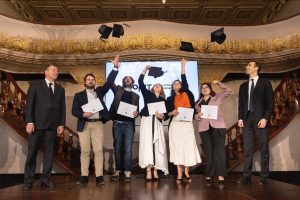The Magazine
👩💻 Welcome to OPIT’s blog! You will find relevant news on the education and computer science industry.
Search inside The Magazine

Source:
- MediaKey, published on February 27th, 2025
For the third consecutive year, Open Institute of Technology has entrusted Simone Guzzardi’s agency with the PR activities and management of the LinkedIn profile of the rector, former Minister Francesco Profumo
Throughout 2025, the L45 team will support OPIT in the most strategic PR activities to strengthen brand awareness and reputation, leveraging the many visibility opportunities that the panorama of excellent online education offers today. In fact, it is a market that is experiencing unprecedented economic growth, thanks to the growing demand for quality skills to face the challenges of this fundamental transition era. In fact, it is estimated that the global online training market in 2026 will double the value it had in 2020, going from 185 billion dollars to 388 billion dollars, and even reaching, according to some, 1000 billion by 2032.
Thanks to the commitment of the founder and director Riccardo Ocleppo, OPIT has recently expanded its educational offering, including 6 degree courses, less than three years after its birth: two three-year degrees in Digital Business and Modern Computer Science, alongside the master’s degrees in Digital Business & Innovation, Responsible Artificial Intelligence, Enterprise Cybersecurity and Applied Data Science & AI.

Source:
- Times of Malta, published on March 18th, 2025
Ricardo Ocleppo, founder of OPIT.
OPIT’s high-profile international teaching staff have been recruited from some of the best universities in the world, including Tier-1 institutes in the US, UK, Canada, Sweden, France, Germany, Italy, Brazil, Poland, Lebanon, and Spain.
On his part, Ricardo Ocleppo shared his reflections on how OPIT is dedicated to producing graduates who are not only job-ready but also prepared to lead the way in an ever-changing technological landscape.
Both Ocleppo and Profumo say they are on a mission to unlock students’ progress and employment on a global scale by providing high-quality and affordable education – a model based on the need for quality, flexibility, inclusivity, and the acquisition of crucial skills in future-ready sectors such as Artificial Intelligence.
OPIT’s student-centric approach delivers a combination of online learning and interactive discussions within a collaborative environment fostering advancement and innovation, including live lessons, masterclasses, videos, quizzes, exercises, and more internally developed digital content that students can access at any time.
With several students and faculty joining remotely, the ceremony also saw graduates present their capstone projects, many of which exhibit real-world applications of emerging technology.
More information about OPIT is available here.

Source:
- EFMD Global, Published on January 30th, 2025.
By Stephanie Mullins
Technological advances, changes around equality and the importance of sustainable initiatives may characterise 2025 for some, but what do people studying in 2025 really need to know?
We spoke to education experts from around the world to find out. From Germany’s Frankfurt School of Finance & Management and Nottingham Business School in the UK to India’s IIM Indore and Italy’s POLIMI Graduate School of Management, here’s what 21 experts actually said…
Sara Ciabattoni, Senior Program Coordinator at OPIT – Open Institute of Technology:
- Master Digital Skills: In today’s fast-evolving digital landscape, it’s essential to master a range of digital tools and platforms. Students should focus not only on developing technical expertise but also on leveraging technology to improve their problem-solving capabilities and drive innovation.
- Focus on Lifelong Learning: The future of work is evolving, bringing challenges but even greater opportunities. The World Economic Forum’s Future of Jobs Report predicts that while some roles will be displaced by technology, even more “jobs of tomorrow” will emerge, underscoring the need to focus on growth rather than disruption. As OPIT Rector Francesco Profumo envisions, education should adopt a circular learning model, much like the circular economy, shifting from a one-time, cradle-to-grave approach to a lifelong cycle of continuous learning. This ensures we stay adaptable and ready for the opportunities of a rapidly changing world.
- Develop Soft Skills: While technical expertise is crucial, employers increasingly prioritise communication, leadership, and collaboration. Cultivating these soft skills alongside academic knowledge will equip students to thrive in the complex, interconnected workplaces of the future.
- Practice Critical Thinking: In an era where information is abundant but not always accurate, students must develop strong critical thinking skills. The ability to evaluate sources, question assumptions, and synthesise new ideas will be essential in making informed decisions.
By prioritising these areas, students can better equip themselves to meet the challenges and seize the opportunities of their academic and professional futures.
Read the full article below:

Source:
- Sheerluxe, Published on January 29th, 2025.
AI is advancing at pace and is now set to transform society, the jobs market and how we do business. On the back of the prime minister pledging to turn the UK into an ‘AI superpower’, we checked in with the experts to find out the latest from the frontline…
What’s the most important thing business leaders or entrepreneurs need to be aware of?
“Leaders need to accept and understand what AI technology can do. I have lived through the internet boom and the initial AI comeback a decade ago in the form of machine learning. Both of these were waves of change in the IT industry that affected every aspect of our society and our lives. But I’ve never seen such a high speed of adoption as with generative AI. Even though the technology is young and not perfect, it is obvious that it fills a real need for most of us, individuals as well as businesses. Therefore, leaders must educate themselves in AI to learn the truth about its capabilities and risks. Use AI to solve a problem; do not invent a clever solution to a problem no one has. Be aware of the new risks that generative AI introduces, like hallucinations and toxicity, and allow use of AI accordingly for your own customers.” – Zorina Alliata, professor of responsible artificial intelligence, digital business & innovation at OPIT
Which industries do you predict will be most disrupted by AI in the next couple of years?
“The financial industry is always one of the first to adopt new technologies. Financial companies are already using generative AI for document processing, risk assessment, fraud prevention and algorithmic trading. Because of increased computing power, we also see AI growth in healthcare and life sciences for drug discovery and enhanced diagnostic procedures. Retail, education, logistics are also adopting AI at a high pace. Which industries will remain unaffected? None, really. Even in high-touch human professions like nursing, therapy, parenting, AI is a tool that can help. While not replacing the job entirely, the industry will change because the AI tools are changing the way the job is done.” – Zorina
Are there any new business models emerging due to AI advancements?
“I think we will see more AI-as-a-service (AIaaS) offerings, where AI tools are built on top of large language models and offer specific capabilities. This is an area where there is a lot of innovation, and I’m excited to see this develop further. I already use AIaaS on a daily basis for better writing, research, creating videos and presentations, and code debugging.” – Zorina
What are the biggest challenges for small businesses and start-ups in adopting AI technologies?
“A big risk is too much enthusiasm and optimism. Generative AI has been adopted at a great speed. When you first try it, it is amazing. It can write a whole paper in seconds. It can explain complex diagrams and concepts. It feels like the trusted assistant you always needed, but it’s important to remember that AI comes with risks. It’s one thing to write an AI service that recommends what movie you should watch next, and another thing to write an AI service that reads your X-ray and diagnoses if you have a tumour. These two applications of AI have very different risk thresholds. You need to plan your AI service or product to be appropriate for use and to minimise the risk for your customer. I’ve also seen start-ups that tried out an idea and are now planning to build a product out of it, without any understanding of what it takes to run AI services at scale. Having best practices implemented, a good operational foundation, governance and a clear operational model are all requisites for running any production systems, especially something as risky and fraught with unknowns as AI products are.” – Zorina
Which ethical considerations should entrepreneurs keep in mind when integrating AI into their businesses?
“Some considerations when creating your risk strategy for AI include data privacy and security (ensuring responsible collection and use of customer data); transparency (being clear about how AI is used in products or services); fairness and bias (addressing potential biases in AI algorithms); job displacement (considering the impact on employees and planning for transitions); accountability (establishing clear responsibility for AI-driven decisions); and environmental impact (considering the energy consumption of AI systems).” – Zorina
How is AI changing customer expectations?
“Customer expectations have gone up significantly since generative AI enabled better interactions. Customers expect omni-channel communications, immediate responses, and predictive service. For those companies that still have fragmented data in several platforms and lack a cohesive customer journey, the learning curve will be steeper. The good news is, there are a lot of innovations in this area.” – Zorina
What skills do you think entrepreneurs will need to succeed in an AI-dominated business world?
“Some skills that would be useful include:
- AI literacy: understanding the basics of AI, machine learning and data science.
- Data analysis & interpretation: ability to work with and derive insights from large datasets.
- Strategic thinking: identifying where AI can add value to business processes and products.
- Ethical decision-making: navigating the ethical implications of AI implementation.
- Adaptability & continuous learning: keeping up with rapidly evolving AI technologies.
- Human-AI collaboration: effectively working alongside AI systems.
- Soft skills: creativity, critical thinking, emotional intelligence and leadership will become even more valuable as AI handles more routine tasks.
As a leader, you are not required to write code or figure out the best way to deploy your model, but a high-level understanding of what AI can do will help you have meaningful conversations with your technical team and create AI products that are truly useful.” – Zorina
Finally, how will AI impact the workforce this year?
“There are several studies on this, such as the one the World Economic Forum (WEF) released this month about the status of work and the future of jobs. Some of the highlights are that AI and other technologies will continue to broaden digital access, with a first effect on increased demand for AI and data skills. The number of technology-related roles is the fastest growing, but frontline roles like farmworkers, delivery drivers and construction workers are predicted to see the largest growth. AI has evolved quickly to create images and videos, threatening the jobs of designers and movie producers. It was not what we would have predicted a few years ago. AI has a way of growing in unexpected ways, as we discover new paths of research and innovate ways to use it. I personally think it is hard to predict exactly where AI will go, and what will be the result of automating all routine tasks and behaving closer to humans. One thing we can be sure of is that people who understand AI and know how to use it will benefit from whatever new challenges are coming our way.” – Zorina
Read the full article below:

Source:
- People & Change 360, Published on January 20th, 2025.
By Francesco Derchi, Chair in Digital Business of OPIT – Open Institute of Technology
Companies face increasing pressure to deliver quick results, often at the expense of future vision. However, a clear and authentic purpose becomes a determining factor in integrating ethics, sustainability and clear objectives that improve competitiveness, productivity and employee loyalty, preventing risks such as “Purpose Washing”
Today, organizations are facing increasing pressure to achieve immediate results, often at the expense of a long-term vision. The ongoing economic uncertainty, fueled by stress, anxiety, global conflicts and technological evolution, seems to push many companies to focus only on short-term profits. However, a concept that could radically change the perspective on business is emerging with force: corporate purpose. Fuelling this debate, more and more professionals and experts who see in the definition of a purpose not only an ethical value, but a real strategic lever to improve corporate competitiveness.
Public debate about a company’s ultimate purpose increased fivefold between 1995 and 2016. Recent research finds that corporate purpose is no longer just a statement of intent, but a guiding principle that can shape operations, define corporate culture, and even positively impact bottom lines.
Historically, companies have always had a clear “reason for being,” often recognized and granted by governments. Their existence was not limited to immediate profit, but responded to a social mandate: to generate value for the community. This concept, which has its roots in the industrial revolution and even in the Roman Empire, has been lost over time, replaced by the logic of maximizing short-term profit.
Why Corporate Purpose Matters More Than Ever
Some experts, however, believe that the time has come to return to a model that places purpose at the center of corporate strategy, without sacrificing profitability. This does not mean denying the need for economic results, but reorienting the company towards a broader objective, which integrates ethics and sustainability. The challenge, therefore, is to find a virtuous model that allows companies to reconcile profits and social responsibility.
Purpose as a strategic lever for business success
Several studies converge on similar data: companies that act consistently with a clear objective outperform the market by 42%. On the contrary, the simple definition of a purpose, without a real integration into daily practices, does not lead to significant results. Finally, companies without a purpose show a lower performance of 42%.
In terms of valuation, over a 12-year period, companies driven by a clear purpose have seen a 175% increase in brand value, compared to an average growth rate of 86% ( source: BCG BrightHouse). This trend is also reflected in consumer behavior: 88% prefer to buy products from companies driven by a clear purpose rather than from companies without a clear direction.
Read the full article below:

Source:
- The Yuan, Published on October 25th, 2024.
By Zorina Alliata
Artificial intelligence is a classic example of a mismatch between perceptions and reality, as people tend to overlook its positive aspects and fear it far more than what is warranted by its actual capabilities, argues AI strategist and professor Zorina Alliata.
ALEXANDRIA, VIRGINIA – In recent years, artificial intelligence (AI) has grown and developed into something much bigger than most people could have ever expected. Jokes about robots living among humans no longer seem so harmless, and the average person began to develop a new awareness of AI and all its uses. Unfortunately, however – as is often a human tendency – people became hyper-fixated on the negative aspects of AI, often forgetting about all the good it can do. One should therefore take a step back and remember that humanity is still only in the very early stages of developing real intelligence outside of the human brain, and so at this point AI is almost like a small child that humans are raising.
AI is still developing, growing, and adapting, and like any new tech it has its drawbacks. At one point, people had fears and doubts about electricity, calculators, and mobile phones – but now these have become ubiquitous aspects of everyday life, and it is not difficult to imagine a future in which this is the case for AI as well.
The development of AI certainly comes with relevant and real concerns that must be addressed – such as its controversial role in education, the potential job losses it might lead to, and its bias and inaccuracies. For every fear, however, there is also a ray of hope, and that is largely thanks to people and their ingenuity.
Looking at education, many educators around the world are worried about recent developments in AI. The frequently discussed ChatGPT – which is now on its fourth version – is a major red flag for many, causing concerns around plagiarism and creating fears that it will lead to the end of writing as people know it. This is one of the main factors that has increased the pessimistic reporting about AI that one so often sees in the media.
However, when one actually considers ChatGPT in its current state, it is safe to say that these fears are probably overblown. Can ChatGPT really replace the human mind, which is capable of so much that AI cannot replicate? As for educators, instead of assuming that all their students will want to cheat, they should instead consider the options for taking advantage of new tech to enhance the learning experience. Most people now know the tell-tale signs for identifying something that ChatGPT has written. Excessive use of numbered lists, repetitive language and poor comparison skills are just three ways to tell if a piece of writing is legitimate or if a bot is behind it. This author personally encourages the use of AI in the classes I teach. This is because it is better for students to understand what AI can do and how to use it as a tool in their learning instead of avoiding and fearing it, or being discouraged from using it no matter the circumstances.
Educators should therefore reframe the idea of ChatGPT in their minds, have open discussions with students about its uses, and help them understand that it is actually just another tool to help them learn more efficiently – and not a replacement for their own thoughts and words. Such frank discussions help students develop their critical thinking skills and start understanding their own influence on ChatGPT and other AI-powered tools.
By developing one’s understanding of AI’s actual capabilities, one can begin to understand its uses in everyday life. Some would have people believe that this means countless jobs will inevitably become obsolete, but that is not entirely true. Even if AI does replace some jobs, it will still need industry experts to guide it, meaning that entirely new jobs are being created at the same time as some older jobs are disappearing.
Adapting to AI is a new challenge for most industries, and it is certainly daunting at times. The reality, however, is that AI is not here to steal people’s jobs. If anything, it will change the nature of some jobs and may even improve them by making human workers more efficient and productive. If AI is to be a truly useful tool, it will still need humans. One should remember that humans working alongside AI and using it as a tool is key, because in most cases AI cannot do the job of a person by itself.
Is AI biased?
Why should one view AI as a tool and not a replacement? The main reason is because AI itself is still learning, and AI-powered tools such as ChatGPT do not understand bias. As a result, whenever ChatGPT is asked a question it will pull information from anywhere, and so it can easily repeat old biases. AI is learning from previous data, much of which is biased or out of date. Data about home ownership and mortgages, e.g., are often biased because non-white people in the United States could not get a mortgage until after the 1960s. The effect on data due to this lending discrimination is only now being fully understood.
AI is certainly biased at times, but that stems from human bias. Again, this just reinforces the need for humans to be in control of AI. AI is like a young child in that it is still absorbing what is happening around it. People must therefore not fear it, but instead guide it in the right direction.
For AI to be used as a tool, it must be treated as such. If one wanted to build a house, one would not expect one’s tools to be able to do the job alone – and AI must be viewed through a similar lens. By acknowledging this aspect of AI and taking control of humans’ role in its development, the world would be better placed to reap the benefits and quash the fears associated with AI. One should therefore not assume that all the doom and gloom one reads about AI is exactly as it seems. Instead, people should try experimenting with it and learning from it, and maybe soon they will realize that it was the best thing that could have happened to humanity.
Read the full article below:
Have questions?
Visit our FAQ page or get in touch with us!
Write us at +39 335 576 0263
Get in touch at hello@opit.com
Talk to one of our Study Advisors
We are international
We can speak in:



